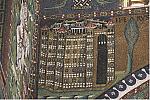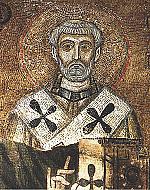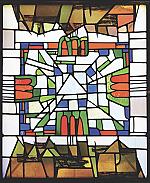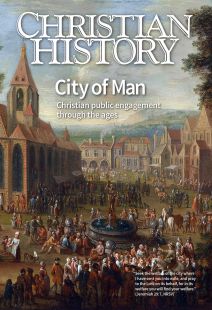City of Man: Editor’s note

[Above: Editor Jennifer Woodruff Tait]
When our senior editor, Chris Armstrong, said that he wanted the final entry in our Faith and Flourishing series to be about civic engagement, right away I thought I knew what he meant. “Oh, yes,” I said; “civics.”
“No,” he said; “not just civics. It’s bigger.”
If it’s been a while since you were in high school, civics is the study of what it means to be a citizen of a country. (It ultimately comes from the Latin word civis, “citizen.”) It’s usually interpreted in our educational systems as the study of what it means to be a good citizen of a country.
In high school, when I took classes about the US and Illinois constitutions and when I studied hard for a quiz on how to treat the US flag, I was learning civics. (I still remember trying to learn how to fold the flag by folding myself as if I were the flag. I don’t advise that you try this at home.)
But civic engagement is bigger. And exploring what it is and how followers of Jesus Christ should do it has been with the church ever since Jesus answered the Jewish elders, “Give to Caesar what is Caesar’s and give to God what is God’s.” Reading the Scriptures (p. 11) Christians have come to two conclusions: this world is not our ultimate home, but we are asked to work for its flourishing while we live in it.
City of God and city of man
This was true even in an early, persecuted church whose members helped not only their own sick and poor, but sick and poor pagans as well. It was true when, after Christianity’s legalization and establishment as the empire’s religion, Augustine in his fifth-century City of God described the contrasts between the City of God and the City of Man.
Through the ages, some have argued either that Christians should have nothing to do with the City of Man—withdrawing into Christian-only enclaves—or that Christians should have everything to do with the City of Man—making themselves indistinguishable from the world.
This issue is about neither of those extremes. Instead it is about artists, preachers, activists, monks, kings, bishops, journalists, missionaries, factory workers, theologians, educators, doctors, and parents—whose lives, lived both inside church walls and outside of them, were shaped by their faith in the City of God in ways that (usually) made them influence the City of Man for the better.
Some Christians in this issue did in fact engage with civics, narrowly defined: they petitioned elected leaders, they voted, they ran for office, they administered government. (As far as I know, none of them folded themselves as if they were the flag.)
But many more engaged in more subtle and sometimes broader ways. They wrote books. They practiced medicine. They created art. They showed hospitality. They exposed corruption. They raised children. They started businesses. They cared for the poor. They worked hand-in-hand with the state at times and at other times endured the state’s persecution. And, at their best moments, they did all these things because they believed that by doing so they followed Jesus and contributed to the spread of God’s kingdom and the flourishing of those around them.
The first three issues in our Faith and Flourishing series have shown us how Christians have worked in various spheres for the common good: science, the marketplace, and higher education. So take heart as we come to the end of this series. Jesus is not picky. He is happy for you to start right where you are and learn to engage your community using your unique talents and interests. Go forth and show his love to your neighbor. CH
By Jennifer Woodruff Tait
[Christian History originally published this article in Christian History Issue #141 in 2021]
Jennifer Woodruff Tait is managing editor of Christian HistoryNext articles
“Seek the welfare of the city”
Some famous Scripture passages that have guided very different approaches to civic engagement








